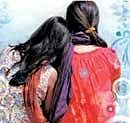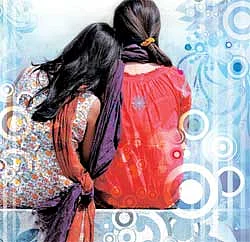
I am 33. For the last few years, all my friends, colleagues and acquaintances have been asking just one thing, when am I going to get married. I tell them I was married, well almost, before my girlfriend dumped me and went to the US. I could never forget her. Such a sad love story! It’s not true. It’s not a lie either. It’s fiction. I have constructed this heterosexual love story meticulously, bit by bit, to the last detail — the day I met her, the day we first kissed, the day she dumped me, everything.
No, I’m not in denial; I’m not in closet either. However, I see no point in confusing those who won’t understand. On the other hand, people who are important to me, they know about me. The pictures on the walls of my flat are good tell-tale signs.
Yet, at 33, I’m terrified being a gay man, and knowing that this is my life. I live alone, far away from home. I have chosen a profession which gives me enough excuses not to visit home often. Whenever I do, my parents, relatives broach that inevitable subject: Marriage. I tell them, not yet, not yet. I need to settle down first. I have consciously avoided being ‘successful,’ so as to avoid the marriage business. But, as I keep adding numbers to my age, I know, I’m running short of excuses. I cannot tell my parents I’m gay. I cannot get married either.
Marriage is the bane in the Indian queer identity (to the opposite sex, that is). How would I avoid it? What am I going to tell my parents? That I’ve become a sanyasin? That I’ve major medical complications? Whatever the reasons, I’m going to break my mother’s heart. By every passing day, I brace myself. I will have to take a stand. It’s my life and I have no rights to spoil another life.
I knew I like men much before I heard the word gay. I was in class VIII. It was a euphoric experience. When I completed 10th, I knew I will have to leave home. I love my family. But I could never be myself at home. I listened to Socrates saying: “An unexperimented life is not worth living.”

I left home. I did various experiments. I changed 10 jobs, and many more one-night stands. Just to understand my identity, I wrote my pre-doctoral thesis in queer theory. According to queer theory, ‘coming out’ is a serious business: “One needs to assert one’s identity vehemently, as the mainstream is always in the process of reclaiming dissidents.”
Dissident I was, but I was mainstream too. In my growing-up years, I couldn’t take a militant stand. If I can be in the mainstream and have what I want, why not? I knew how to pretend that you are looking at the girl when in reality you are ogling at her hunk boyfriend. I knew where to focus while watching a porno film. I spent five years in hostels. Those where glorious days; until I fell in love. That was the most important event in my life and I could not share it with anybody. I knew nobody will understand me. I understood the mainstream well.
That made me somewhat militant about my identity. I left hostel and rented a place of my own. Now I could hang the posters on my wall which I could not do in the hostel room. In the process, I lost a few friends. Probably, I was sending wrong signals; probably they were homophobic. This made it important for me to come out to my friends. If we part ways, let’s be frank about the reasons. A few of them did not believe me when I told them point blank, I’m gay. A few of them tried to dissuade me. I listened to them, and ignored them. Now, after so many years, they are still my friends, even if a few of them cannot even utter the G-word.
Most people confuse ‘coming out’ with seeking approval. You say I’m gay. You expect the other party to say, that’s all right with me. That’s condescending. I don’t need anyone’s approval to assert my orientation. For me, coming out means expressing the preference, like going to a party and saying you drink only Caribbean rum; no plain whisky will do.
My gay friends tell me tales of homophobia, of exploitations and abuses. I have never experienced those myself. That’s because I know how to play mainstream — the heterosexual, upper class male. I can laugh at the gay joke without feeling offended. I’m what my gay friends call ‘a straight-acting gay.’ I see no harm in that. Once they take me into confidence, I try to ‘educate’ them. I know several mainstream homophobes who now understand the meaning of gay beyond the limitations of Dostana.
At 25, I fell in love. He was twice my age. For one year I did nothing but be in love. One day, I discovered he’s married with two grown-up sons. Now, he’s dead, and I still love him and can love no one else. Nonetheless, I have numerous lovers, and their number on my mobile. I live alone. This makes me a prize among my lovers, most of whom do not have any place to make out.
Queer theory says being gay is not just a sexual orientation, it’s a lifestyle. It involves everything, from the way you dress to what you read. This is something I haven’t able to reconcile yet. I have several lives. My lovers are not my friends. My friends are not my colleagues. My gay friends do not know my straight friends — The categories are endless, and I play them effortlessly. For me, identity is how you want others to perceive you — your hair style, your eyebrow ring.
I am scared being gay. I hide my fears under a masculine bravado. I love to wear jewellery. I never wear them in public. On a bad day, I’m tired of these different identities. I wish I was like other ‘normal’ folks, have a wife and a child, and where you don’t have to be constantly on guard. Then the bad day passes, and I wonder, how some people can live such mundane lives.
I love movies. Characters in the movies give me catharsis which people around me cannot. I am a sucker for happy endings, for I know, I wouldn’t have one in my life. But this is my life and I won’t have it in any other way.
(The writer is the co-editor of ‘Whistling in the Dark: 21 Queer Interviews’.)
